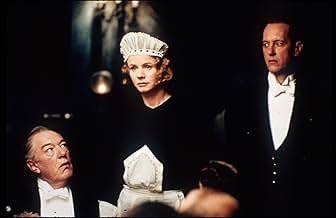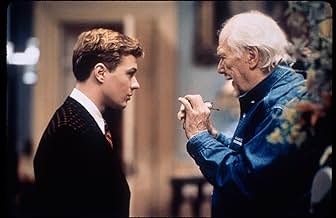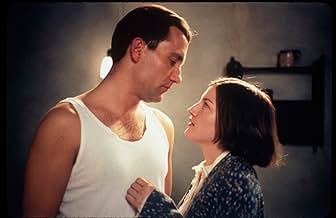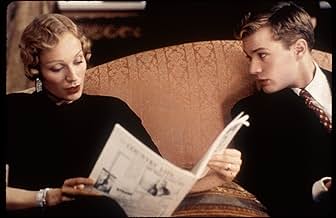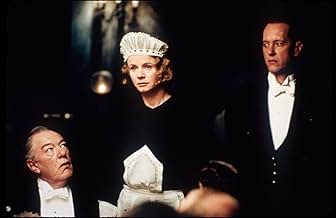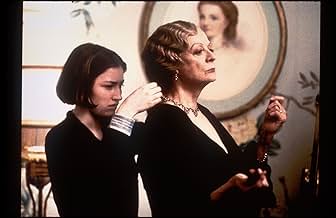Set in the 1930s, a group of pretentious rich and famous get together for a weekend of relaxation at a hunting resort. But when a murder occurs, each one of these interesting characters beco... Read allSet in the 1930s, a group of pretentious rich and famous get together for a weekend of relaxation at a hunting resort. But when a murder occurs, each one of these interesting characters becomes a suspect.Set in the 1930s, a group of pretentious rich and famous get together for a weekend of relaxation at a hunting resort. But when a murder occurs, each one of these interesting characters becomes a suspect.
- Director
- Writers
- Stars
- Won 1 Oscar
- 36 wins & 74 nominations total
- Director
- Writers
- All cast & crew
- Production, box office & more at IMDbPro
Featured reviews
The acting is superb, and this is a movie that really benefited from its great actors. Too often people will praise the acting of a film just because it has famous people in it, even of their talents weren't fully utilized for the characters they portrayed. But these characters were complex and it was those subtle aspects of the acting, the brief facial expressions, tones of voice, and other details that took the film to the next level.
Interesting character studies, an enticing mystery, a bit of humor, an homage to classic detective films, and a drama that gives you a glimpse of a very specific little world, one that you're probably not accustomed to. Those are the things you can expect from Gosford Park, and I highly recommend it.
Bob Balaban and Robert Altmann story idea combined with Fellowes's eloquent writing is first rate. The dialogues are filled with wit, humour and subtle depth. The mansion itself plays a key character in the story but it is the spellbinding cinematography that functions as the mansion's eyes. The camera is constantly on the move and the viewer feels like an ignored but curious member of the crowd. Many themes are tackled in the movie but it is done quietly. The film also slowly demonstrates the disintegration of the English class system (that started around the war).
Altman has assembled a mountain of talented actors that include a bitchy Maggie Smith, a pompous Michael Gambon, an obnoxious Kristin Scott Thomas, a vulnerable Camilla Rutherford, a desperate Tom Hollander, a devil-may-care Geraldine Somerville, a knows-where-he-stands Jeremy Northam, a douchebag Bob Balaban, a horny Ryan Phillipe, a stupid Stephen Fry, a loyal Sophie Thompson, a principled Helen Mirren, an enigmatic Clive Owen, a no-nonsense Emily Watson, a not-to-be-messed-with Richard E. Grant, a pulling-it-together Derek Jacobi, a frightened Alan Bates, a grumpy Eileen Atkins and an adorable Kelly Macdonald. 'Gosford Park' has one of the best ensemble cast.
I also loved the soundtrack. It is never overdone. The jazzy tracks contribute well in setting the atmosphere and there are some wonderful songs performed by Jeremy Northam's character.
In the beginning, it is a little difficult to keep up with the names of the characters which leads to a bit of confusion but with a little bit of patience, once you're over that, it becomes easy to follow. Like a beautiful painting, once it captivates the viewers attention it immediately involves them in an alternate world. From the start, you feel like an ignored guest and at the end it's as though the host has just seen you out.
Altman's preferences for kaleidoscopic social observation has sometimes failed in the past due to the weight of its own ambition: multi-plotted and multi-charactered snapshots of time and place held together by loose ties or a general thematic framework. Sometimes it pays off spectacularly (Nashville); sometimes it flatters to deceive (Short Cuts).
It works well here due to the necessary discipline of the single location and the greater opportunities for interaction among the characters this affords. Add to that an exemplary cast of (mostly) British character actors and a knowing script by Julian Fellowes that gives Altman's keenly observant camera plenty of time to make its own points.
Rightly, Altman is less concerned with the murder mystery, which is almost an aside, than with the opportunity given by a shooting party at a 1930s stately mansion to observe the English aristocracy and their servants in social interaction.
Never happier than when involved in a bit of human anthropology, Altman lightly dissects the complexities and hierarchies which go on both above and below stairs; in which many subtle and unsubtle rituals are played out among groups of people who clearly dislike each other but are forced through circumstance, need or employment to observe the fundamental social practices required.
1932 is also a time of intruding change into the nature of the old English ruling classes, slowly disintegrating in this between-wars period and, in this case, largely reliant on the wealth of one particularly reluctant patron to keep them in furs and flunkies. In on this act comes the (to them) faintly odious whiff of 20th century new money, represented by Hollywood and popular culture. These intruders are kept in their place, but the message is clear - change is coming, and coming fast.
The muted colours and autumnal setting continue this theme of a world in terminal decline and of a group of characters keenly conscious of place and tradition yet also wearied and exhausted by it. Only at the very end, when fundamental change has occurred and many characters are left to face up to very different destinies do we see a bit of sunshine creeping in, heralding the dawn of a new era.
The cast are all excellent, with special mention deserving of Maggie Smith's effortless scene stealing as a bitchy but broke old Countess; the ever reliable Jeremy Northam as matinee idol Ivor Novello, well aware of his place in the great scheme of things and young Kelly Macdonald in the pivotal role of Smith's harassed maid who's inquisitiveness rattles a whole load of family skeletons.
What was surprising was the level of humour that Altman brings to what is, as it unfolds, a very sad story of transgression and loss. Maggie Smith has all the funniest lines as a viscious but impoverished woman who comes to her family with begging cap in hand. Those playing characters "above stairs" all look and sound the part and effortlessly give the impression of wealth and privelege and the callousness that breeds.
Many of the "downstairs" characters drive the story and there are some wonderfully wry performances from the likes of Richard E Grant and Alan Bates. As the moral centre of the film, Kelly McDonald is excellent and is well matched by Emily Watson as Emily and Clive Owen as Parkes. Ruling the downstairs troop is Helen Mirren whose cool visage hides a seething mass of emotion. A well deserved nomination here.
Only Robert Altman could assemble a cast of this magnitude and distinction and have many of them speak no more than a few lines ! Greats of English theatre like Derek Jacobi have small but memorable roles and there is not a bad note struck from any of the predominantly English cast.
I was slightly puzzled by the character played by Ryan Phillipe (although his perforamce was fine) but felt that the intrusion of two Americans into this English mix worked well to highlight the entrenched class roles played by everyone in the house.
Whilst perhaps not his best work, this is a very good Altman film - we move in and out of conversations whilst never losing their import and the cimematography has a fluidity that few other film makers can match.
A classy piece of film-making that rewards careful attention from the viewer.
One of the best aspects of film is how it illustrates that fine line dividing the master-servant social structures, and how often that line is crossed, reminding us that life is just a game of costumes and masks, and we're all the same underneath. While the story was reminiscent of Agatha Christie's Ten Little Indians, where it's the mystery that captivates the audience, Altman goes beyond the mystery with Gosford Park by using the murder as a vehicle to draw attention to the human condition and class hierarchy.
On the downside, but to no surprise to fans of Altman's work, the movie is often hard to follow. His style of filmmaking involves entanglements of characters and subplots that don't appear to have much to do with one another at first blush, and Gosford Park takes this to the next level. Here, the murder takes place at the climax of this confusion, leaving you rather disoriented in the middle of the 2-hour-plus drama. Fortunately, the tone loosens up when a comedy-dim police inspector basically gets nowhere in his investigation, but the pieces start coming together through the other characters. The good news is that it all seems to come together in the end in a way that didn't require grasping every detail of every scene.
Despite its intricacies and confusing moments, there is so much more to Gosford Park that makes it interesting and enchanting. While it is clearly a sophisticated piece of film work with impeccable acting, directing and design, don't stress about not keeping up with it all the time. Sit back and take it in, and you'll feel satisfied in the end.
Did you know
- TriviaThe camera is always moving (if only slightly) in every shot as requested by producer and director Robert Altman.
- GoofsThe movie takes place in 1932 but some of the songs Ivor Novello sings for the guests didn't come out until years after, like "Glamorous Night" (1935), "Why It Wasn't You" (1937), "I Can Give You a Starlight" (1939) and "Waltz of My Heart" (1939).
- Quotes
[Morris Weissman is asked about his upcoming movie project]
Lady Sylvia McCordle: Mr Weissman.
Morris Weissman: Yes?
Lady Sylvia McCordle: Tell us about the film you're going to make.
Morris Weissman: Oh, sure. It's called "Charlie Chan In London". It's a detective story.
Mabel Nesbitt: Set in London?
Morris Weissman: Well, not really. Most of it takes place at a shooting party in a country house. Sort of like this one, actually. Murder in the middle of the night, a lot of guests for the weekend, everyone's a suspect. You know, that sort of thing.
Constance: How horrid. And who turns out to have done it?
Morris Weissman: Oh, I couldn't tell you that. It would spoil it for you.
Constance: Oh, but none of us will see it.
- Crazy creditsThe cast credits at the end are separated between above stairs, visitors and below stairs, arguably listed in order of status within the British class system.
- ConnectionsFeatured in Siskel & Ebert: The Best Films of 2001 (2001)
- SoundtracksWaltz of My Heart
Performed by Christopher Northam
Composed by Ivor Novello & Christopher Hassall (as Christopher V. Hassall)
© Chappell/Music Limited
By Kind Permission of Warner/Chappell Music Ltd
- How long is Gosford Park?Powered by Alexa
- Who is who?
- Was Ivor Novello a real person?
- How could "The Americans" not know how the breakfast was served on the third day?
Details
- Release date
- Countries of origin
- Official site
- Languages
- Also known as
- Muerte a la media noche
- Filming locations
- Syon House, Syon Park, Brentford, Middlesex, England, UK(interiors: upstairs bedrooms)
- Production companies
- See more company credits at IMDbPro
Box office
- Budget
- $19,800,000 (estimated)
- Gross US & Canada
- $41,308,615
- Opening weekend US & Canada
- $241,219
- Dec 30, 2001
- Gross worldwide
- $87,754,044
- Runtime2 hours 17 minutes
- Sound mix
- Aspect ratio
- 2.35 : 1
Contribute to this page




